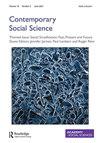Cross-border identity as a daily resistance tactic in a time of global health emergency: Gorizia-Nova Gorica go borderless
IF 3.9
Q1 SOCIAL SCIENCES, INTERDISCIPLINARY
引用次数: 0
Abstract
ABSTRACT Ulrich Beck represented risk society as the overcoming of the nation states as the container of the respective civil societies. The social contract which was at the base of the construction of what Anderson defined the imagined communities, sanctioned the renunciation by the populations of part of their prerogatives of freedom in favour of the security guaranteed by the sovereign power. The present global health emergency seems to have proposed the same social pact: more security and less freedom especially of movement of people segregated within the apparently resurging nation states by new borders and walls. The remaining residue of globalisation is its economic-financial globalism. Yet ethnographic analysis along border areas reveals a consolidated cross-border identity experienced in people's everyday life as a tactic of resistance against the erection of new self-containment barriers. This contribution aims to analyse the salient aspects of this phenomenon in the city of Gorizia, which for decades has constituted an integrated metropolitan area of the Italian and Slovenian zones, defining a specific cross-border identity shared by both Italian and Slovenian citizens. This identity has not given way in front of the walls that have been restored in recent months in order to contain the contagion and therefore could represents what de Certeau defined as a tactic of resistance that in the present case bears witness to the invention of an increasingly cosmopolitan daily life.在全球卫生紧急情况下,跨境身份是一种日常抵抗策略:Gorizia Nova Gorica无国界
摘要乌尔里希·贝克将风险社会描述为民族国家作为各自公民社会容器的克服。社会契约是构建安德森所定义的想象中的社区的基础,它批准人民放弃他们的部分自由特权,以支持主权国家所保障的安全。当前的全球卫生紧急情况似乎提出了同样的社会契约:更多的安全,更少的自由,尤其是在那些被新的边界和墙隔离的明显复兴的民族国家中的人们的行动。全球化的残余是经济金融全球化。然而,边境地区的民族志分析揭示了人们日常生活中所经历的一种巩固的跨境身份,这是一种抵抗建立新的自我遏制障碍的策略。这篇文章旨在分析戈里齐亚市这一现象的突出方面。几十年来,戈里齐亚一直是意大利和斯洛文尼亚地区的综合大都市,定义了意大利和斯洛文尼亚公民共同的特定跨境身份。这种身份并没有在近几个月来为遏制传染而修复的墙壁前让步,因此可能代表了德塞尔托所定义的一种抵抗策略,在本案中,这种抵抗策略见证了日益国际化的日常生活的发明。
本文章由计算机程序翻译,如有差异,请以英文原文为准。
求助全文
约1分钟内获得全文
求助全文
来源期刊

Contemporary Social Science
SOCIAL SCIENCES, INTERDISCIPLINARY-
CiteScore
6.40
自引率
8.30%
发文量
15
 求助内容:
求助内容: 应助结果提醒方式:
应助结果提醒方式:


